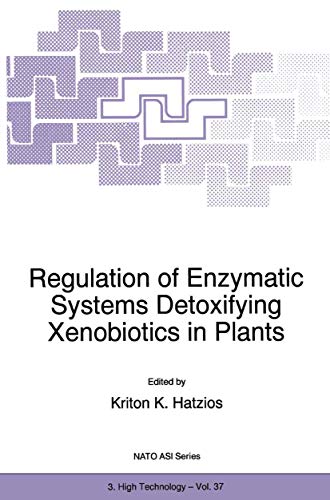Verwandte Artikel zu Regulation of Enzymatic Systems Detoxifying Xenobiotics...
Regulation of Enzymatic Systems Detoxifying Xenobiotics in Plants: 37 (NATO Science Partnership Subseries: 3) - Hardcover

Inhaltsangabe
The NATO Advanced Research Workshop (ARW) on "Regulation of Enzymatic Systems Detoxifying Xenobiotics in Plants" intended to provide a forum to scientists from academia, industry, and govemment for discussing and critically assessing recent advances in the field of xenobiotic metabolism in plants and for identifying new directions for future research. Plants function in a chemical environment made up of nutrients and xenobiotics. Xenobiotics (foreign chemicals) are natural or synthetic compounds that can not be utilized by plants for energy-yielding metabolism. Plants may be exposed to xenobiotics either deliberately, due to their use as pesticides or accidentally, from industrial, agricultural, and other uses. Plants, like most other organisms, evolved a remarkable battery or metabolic reactions to defend themselves against the potentially toxic effects of xenobiotics. The main enzymatic reactions utilized by plants for xenobiotic detoxification include oxidation, reduction, hydrolysis and conjugation with glutathione, sugars (e.g., glucose), and amino acids. Eventually, xenobiotic conjugates are converted to insoluble bound residues or to secondary conjugates, which are deposited in the vacuole of plant cells.
Die Inhaltsangabe kann sich auf eine andere Ausgabe dieses Titels beziehen.
Críticas
`It should therefore be recommended to all plant scientists and agronomists ...'
Journal of Plant Physiology, 154 (199)
`...written by plant pysiologists dedicated to this field of research, the book contains a wealth of up-to-date information about the regulation of xenobiotic detoxification. It should therefor be recommended to all plant scientists adn agronomists, should they be interested in plant protection or not.'
Reseña del editor
The NATO Advanced Research Workshop (ARW) on "Regulation of Enzymatic Systems Detoxifying Xenobiotics in Plants" intended to provide a forum to scientists from academia, industry, and govemment for discussing and critically assessing recent advances in the field of xenobiotic metabolism in plants and for identifying new directions for future research. Plants function in a chemical environment made up of nutrients and xenobiotics. Xenobiotics (foreign chemicals) are natural or synthetic compounds that can not be utilized by plants for energy-yielding metabolism. Plants may be exposed to xenobiotics either deliberately, due to their use as pesticides or accidentally, from industrial, agricultural, and other uses. Plants, like most other organisms, evolved a remarkable battery or metabolic reactions to defend themselves against the potentially toxic effects of xenobiotics. The main enzymatic reactions utilized by plants for xenobiotic detoxification include oxidation, reduction, hydrolysis and conjugation with glutathione, sugars (e.g., glucose), and amino acids. Eventually, xenobiotic conjugates are converted to insoluble bound residues or to secondary conjugates, which are deposited in the vacuole of plant cells.
„Über diesen Titel“ kann sich auf eine andere Ausgabe dieses Titels beziehen.
EUR 105,00 für den Versand von Deutschland nach USA
Versandziele, Kosten & DauerNeu kaufen
Diesen Artikel anzeigenEUR 13,80 für den Versand von Vereinigtes Königreich nach USA
Versandziele, Kosten & DauerSuchergebnisse für Regulation of Enzymatic Systems Detoxifying Xenobiotics...
Regulation of Enzymatic Systems Detoxifying Xenobiotics in Plants (NATO Science Partnership Subseries: 3, 37)
Anbieter: Ria Christie Collections, Uxbridge, Vereinigtes Königreich
Zustand: New. In. Artikel-Nr. ria9780792346463_new
Anzahl: Mehr als 20 verfügbar
Regulation of Enzymatic Systems Detoxifying Xenobiotics in Plants
Anbieter: Buchpark, Trebbin, Deutschland
Zustand: Sehr gut. Zustand: Sehr gut | Sprache: Englisch | Produktart: Bücher. Artikel-Nr. 3031039/202
Anzahl: 1 verfügbar
Regulation of Enzymatic Systems Detoxifying Xenobiotics in Plants
Anbieter: buchversandmimpf2000, Emtmannsberg, BAYE, Deutschland
Buch. Zustand: Neu. Neuware -The NATO Advanced Research Workshop (ARW) on 'Regulation of Enzymatic Systems Detoxifying Xenobiotics in Plants' intended to provide a forum to scientists from academia, industry, and govemment for discussing and critically assessing recent advances in the field of xenobiotic metabolism in plants and for identifying new directions for future research. Plants function in a chemical environment made up of nutrients and xenobiotics. Xenobiotics (foreign chemicals) are natural or synthetic compounds that can not be utilized by plants for energy-yielding metabolism. Plants may be exposed to xenobiotics either deliberately, due to their use as pesticides or accidentally, from industrial, agricultural, and other uses. Plants, like most other organisms, evolved a remarkable battery or metabolic reactions to defend themselves against the potentially toxic effects of xenobiotics. The main enzymatic reactions utilized by plants for xenobiotic detoxification include oxidation, reduction, hydrolysis and conjugation with glutathione, sugars (e.g., glucose), and amino acids. Eventually, xenobiotic conjugates are converted to insoluble bound residues or to secondary conjugates, which are deposited in the vacuole of plant cells.Springer Verlag GmbH, Tiergartenstr. 17, 69121 Heidelberg 404 pp. Englisch. Artikel-Nr. 9780792346463
Anzahl: 2 verfügbar
Regulation of Enzymatic Systems Detoxifying Xenobiotics in Plants
Anbieter: AHA-BUCH GmbH, Einbeck, Deutschland
Buch. Zustand: Neu. Druck auf Anfrage Neuware - Printed after ordering - The NATO Advanced Research Workshop (ARW) on 'Regulation of Enzymatic Systems Detoxifying Xenobiotics in Plants' intended to provide a forum to scientists from academia, industry, and govemment for discussing and critically assessing recent advances in the field of xenobiotic metabolism in plants and for identifying new directions for future research. Plants function in a chemical environment made up of nutrients and xenobiotics. Xenobiotics (foreign chemicals) are natural or synthetic compounds that can not be utilized by plants for energy-yielding metabolism. Plants may be exposed to xenobiotics either deliberately, due to their use as pesticides or accidentally, from industrial, agricultural, and other uses. Plants, like most other organisms, evolved a remarkable battery or metabolic reactions to defend themselves against the potentially toxic effects of xenobiotics. The main enzymatic reactions utilized by plants for xenobiotic detoxification include oxidation, reduction, hydrolysis and conjugation with glutathione, sugars (e.g., glucose), and amino acids. Eventually, xenobiotic conjugates are converted to insoluble bound residues or to secondary conjugates, which are deposited in the vacuole of plant cells. Artikel-Nr. 9780792346463
Anzahl: 1 verfügbar
Regulation of Enzymatic Systems Detoxifying Xenobiotics in Plants
Anbieter: Kennys Bookstore, Olney, MD, USA
Zustand: New. 1997. Hardcover. . . . . . Books ship from the US and Ireland. Artikel-Nr. V9780792346463
Anzahl: 15 verfügbar

